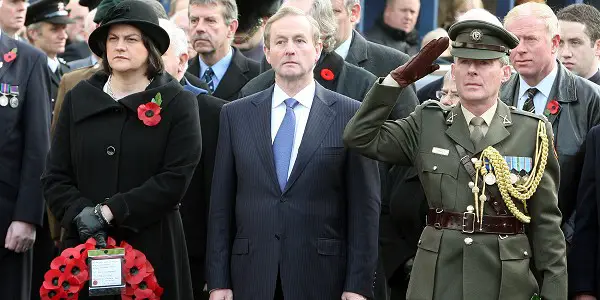Taoiseach Enda Kenny has declared his disappointment in Northern Ireland’s new First Minister over her plans to snub 1916 Easter Rising commemorations.
Moments after Arlene Foster was appointed Stormont leader, Mr Kenny also suggested it was her duty to represent nationalists as well as unionists in the power-sharing executive.
Last week, the Democratic Unionist Party leader said she would not attend any of the commemorations of the 100-year-old rebellion against British rule.
During a briefing at Government Buildings around the time Ms Foster was being installed as First Minister, Mr Kenny said he wished her well in her new role but added he was disappointed with her remarks.
“Obviously, I’m disappointed that she has said that she would not attend any of the centenary commemorations,” he said.
“These (commemorations) have been put together in a very sensitive, comprehensive, inclusive way – both north and south.”
The rising in Dublin was a seminal moment in Irish history which ultimately led to partition and the creation of both the Republic of Ireland and Northern Ireland.
Ms Foster denounced the event as an attack on the state and democracy which more recently gave “succour” to violent republicans in Northern Ireland.
Mr Kenny pointed out that nationalist leaders in Northern Ireland had attended commemorations and events in recent years, traditionally the preserve of the unionist community, as part of peace-building efforts.
“There are people of the nationalist persuasion in Northern Ireland who have attended at many sensitive issues,” he said.
“I’ve been up at Enniskillen myself for the last number of years, on the occasion of the wreath laying, where I have met Arlene over the last four years.”
Mr Kenny, who leads senior coalition partner Fine Gael, became the first taoiseach to attend a Remembrance Day service in Northern Ireland when he took part in commemorations at Enniskillen in 2012.
Eleven people who had gathered to pay respects were killed and dozens more were injured in the no-warning IRA bomb at the war memorial in 1987.
Mr Kenny has returned to the event every year since.
“In the case of representing all the people of Northern Ireland, both nationalist and unionist, obviously they have come together in quite a number of areas,” Mr Kenny added, during his remarks in Dublin.
However, Mr Kenny added that he has known Ms Foster for years and wished her the best in her new role, taking over from Peter Robinson.
“I wish her well,” he said.
“I would hope that on some of the (1916 commemoration) occasions – which are very broadly based, very comprehensive, very inclusive – that it might be possible for her to attend.”
He added: “I congratulate her and wish her the best in restoring confidence to the (Northern Ireland) Executive and the Assembly.”
In the weekend interview, Ms Foster said it would not be right for her as a democrat to take part in the commemorations.
“Easter 1916 was a very violent attack on the state,” she said.
“And it wasn’t just an attack on the state. It was an attack against democracy at that time.”
She added: “When you look at the history of commemorations of Easter 1916 it is only relatively recently that the government of the Republic of Ireland have commemorated that occasion because actually it gave succour to violent republicanism here in Northern Ireland over many years.
“It would be wrong for me as the leader of Northern Ireland to give any succour to those sorts of people.”
Throughout 2016, more than 40 state ceremonial events will be held as part of the Ireland 2016 Centenary Programme.
One of the highlights will be a major parade from Dublin Castle to Parnell Square on Easter Sunday.
Oxford and Cambridge universities are among major UK institutions marking the anniversary.
Centenary celebrations at London’s Royal Festival Hall, the Barbican Centre, as well as venues in Birmingham, Manchester, Glasgow, Cardiff and other cities are among more than 87 events in the UK throughout the year.
Commenting on the issue shortly after assuming her new role, Ms Foster said she would consider attending symposium-type events to discuss the Easter Rising as opposed to a specific commemoration.
She said: “Enda shouldn’t be surprised that I wouldn’t go to a commemoration in Dublin in and around that issue.
“Will I go and discuss historical significance, will I go and have other conversations about what happened in 1916? Yes I will of course.
“But I think it would be wrong as a unionist to go and commemorate a rising which took place against the State of the United Kingdom and indeed, gave succour to a lot of violent republicans during the years of the Troubles here in Northern Ireland.”